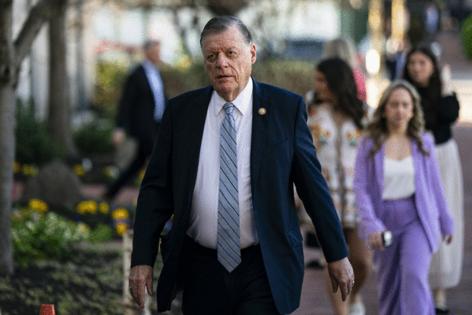Appropriations chairman bullish on full-year spending bills after shutdown
Published in Political News
WASHINGTON — Appropriators could finish drafting a compromise version of a three-bill spending package for fiscal 2026 in “two or three days” once the partial government shutdown is over, House Appropriations Chairman Tom Cole, R-Okla., said last week.
The shutdown has stalled work on full-year appropriations for more than three weeks, but Cole said lawmakers in both chambers are close to finishing compromise drafts of the Agriculture, Legislative Branch and Military Construction-VA bills. Those can’t move forward, however, until the government reopens, he said.
Democrats are insisting on an agreement to extend expiring health care subsidies before voting to reopen the government, and Republicans are refusing to negotiate until the shutdown ends.
Cole said Oct. 23 that he had spoken separately to both House Appropriations ranking member Rosa DeLauro, D-Conn., and Senate Appropriations Chair Susan Collins, R-Maine, about both those initial three bills and the remaining nine fiscal 2026 bills.
During the shutdown, staff-level and member-level conversations are ongoing on “what are the ways, if we can get to this, that we can find common ground,” Cole said.
“We’re continuing to have an open dialogue, but what we really need is the government open again so the process can move forward,” he said. “And I’m convinced that if we do that, we can come to agreements pretty quickly on most of the bills.”
After getting the first package to the finish line, appropriators would then take up a second package of bills, the contents of which have not been finalized.
Cole has previously expressed a preference for a package featuring the Energy-Water, Interior and Transportation-HUD bills; the Senate has been eyeing a larger package featuring the two biggest annual spending bills, Defense and Labor-HHS-Education.
“We’ve had good negotiations on whether we should do the bigger package, or another smaller package,” Cole said. “We can go in either direction. That really depends on leadership on both sides saying we want this, rather than that.”
Cole said he believed lawmakers could get more than the first package done by Nov. 21, when a funding extension proposed by the House-passed continuing resolution would expire.
Meeting that goal is contingent on the shutdown ending shortly, he said. But either way, another funding extension would be needed past that date because full-year appropriations won’t be completed by then.
“They’re burning up daylight, and we’re going to need some additional time, I acknowledge that,” he said. “I can’t tell you how much time we’re going to need until we can get back to the negotiations.”
Still, Cole said he remained bullish on lawmakers’ ability to complete full-year spending bills, despite the ill will between the parties that is festering during the shutdown.
“I think the desire of all appropriators on both sides to make sure that we get our work done is really pretty high,” he said. “So I think that’s a powerful incentive to get these bills done. But the real nut to crack is getting the government open.”
As the lapse drags on, some Republicans have floated the idea of resorting to another full-year continuing resolution, which would keep discretionary spending relatively frozen for a third consecutive fiscal year. Senate Majority Leader John Thune, R-S.D., has said a longer-term stopgap measure will be needed if Democrats continue to block the House-passed extension.
Democrats would be very unlikely to accept another full-year extension at fiscal 2024 spending levels, and 60 votes are needed to advance spending bills in the Senate, where Republicans hold 53 seats.
Cole said that appropriators in both parties strongly oppose a yearlong stopgap, which would chip away at Congress’ power to set the federal government’s spending priorities.
“We actually all agree on that. We don’t want a full-year CR. We want as many of these bills negotiated individually, or in small packages, that we agree makes sense,” he said.
If leadership were to put forward a full-year stopgap bill, Cole said he couldn’t completely rule out voting for it, as he “never says never.”
“But I’m not for a full-year CR, under any circumstances,” he said.
©2025 CQ-Roll Call, Inc., All Rights Reserved. Visit cqrollcall.com. Distributed by Tribune Content Agency, LLC.
























































Comments